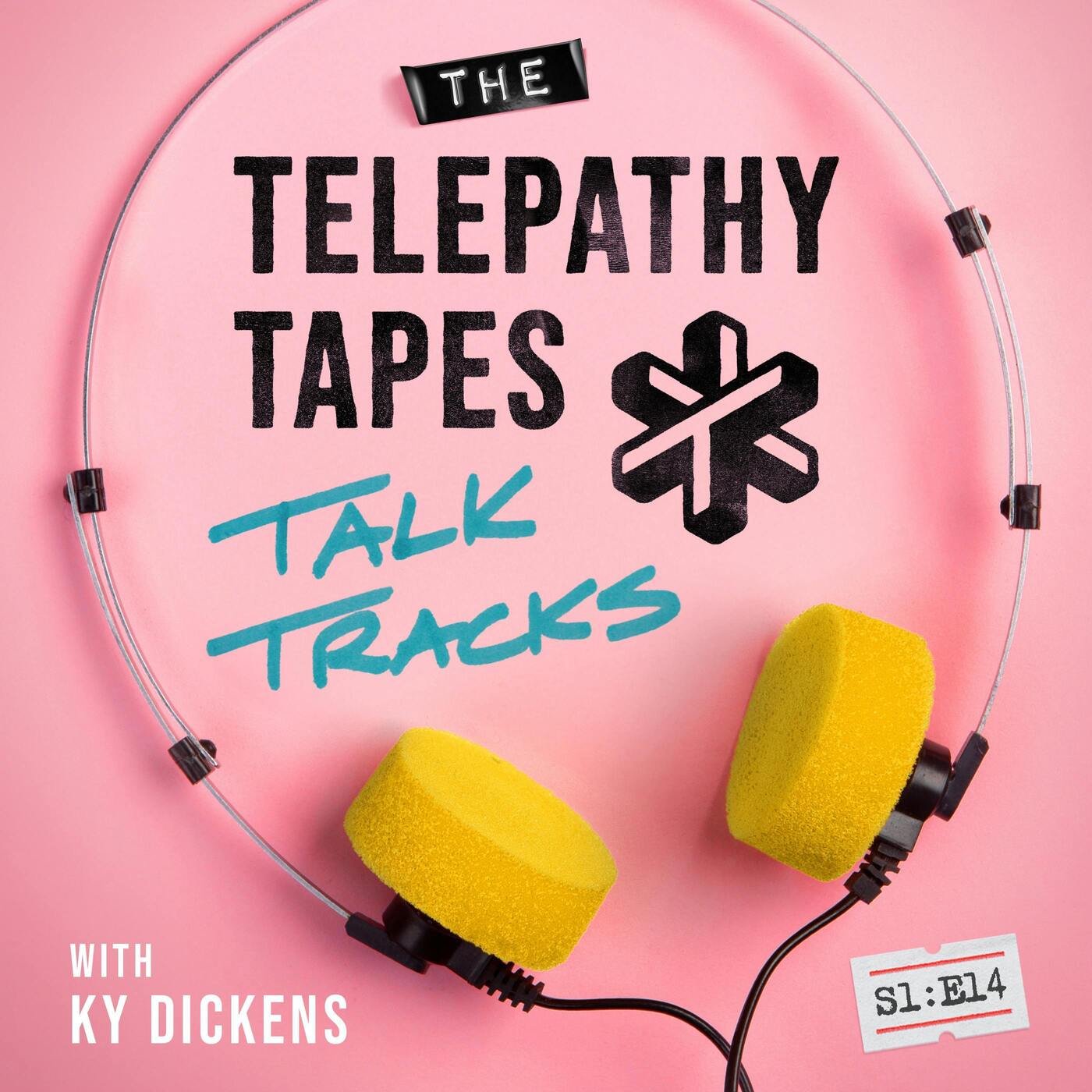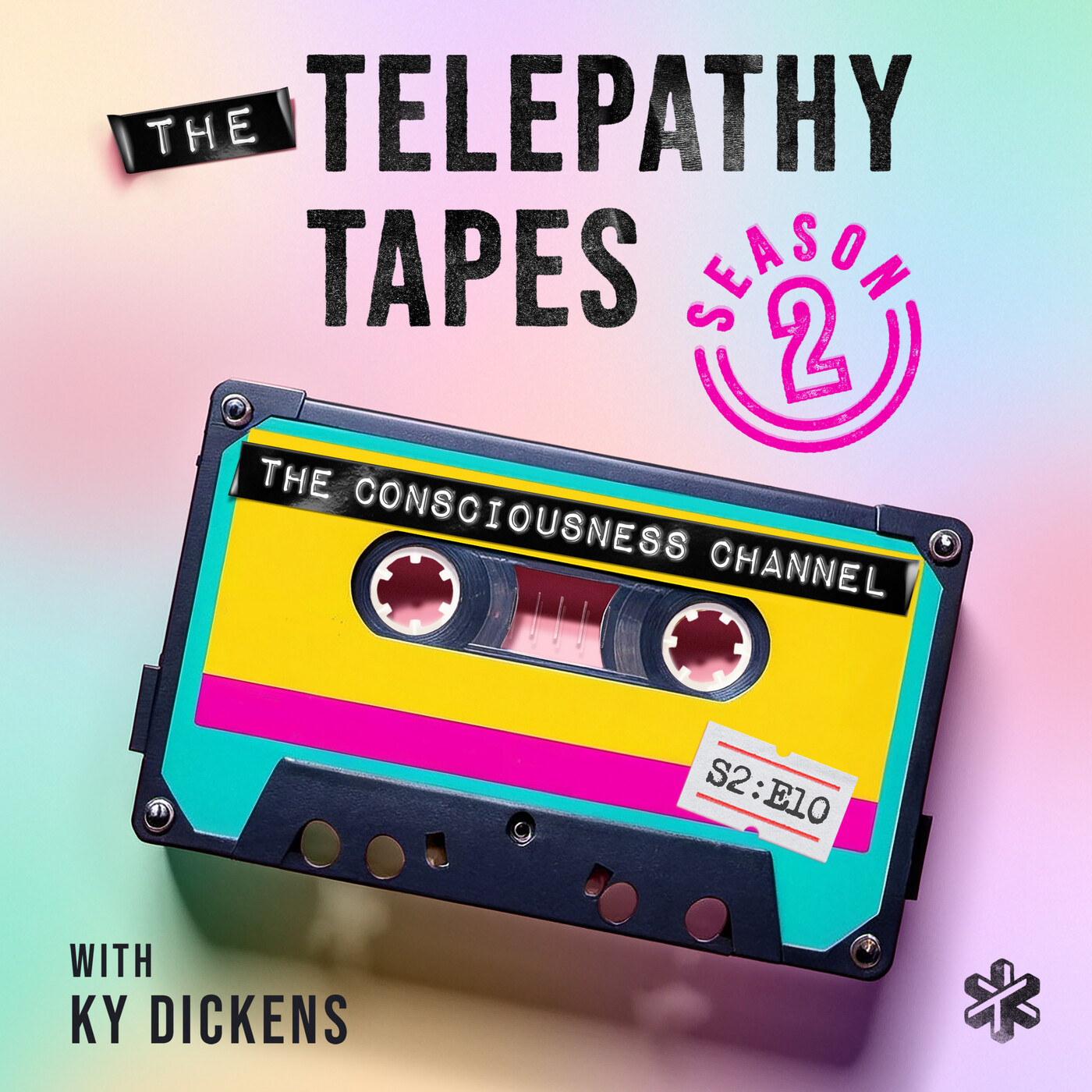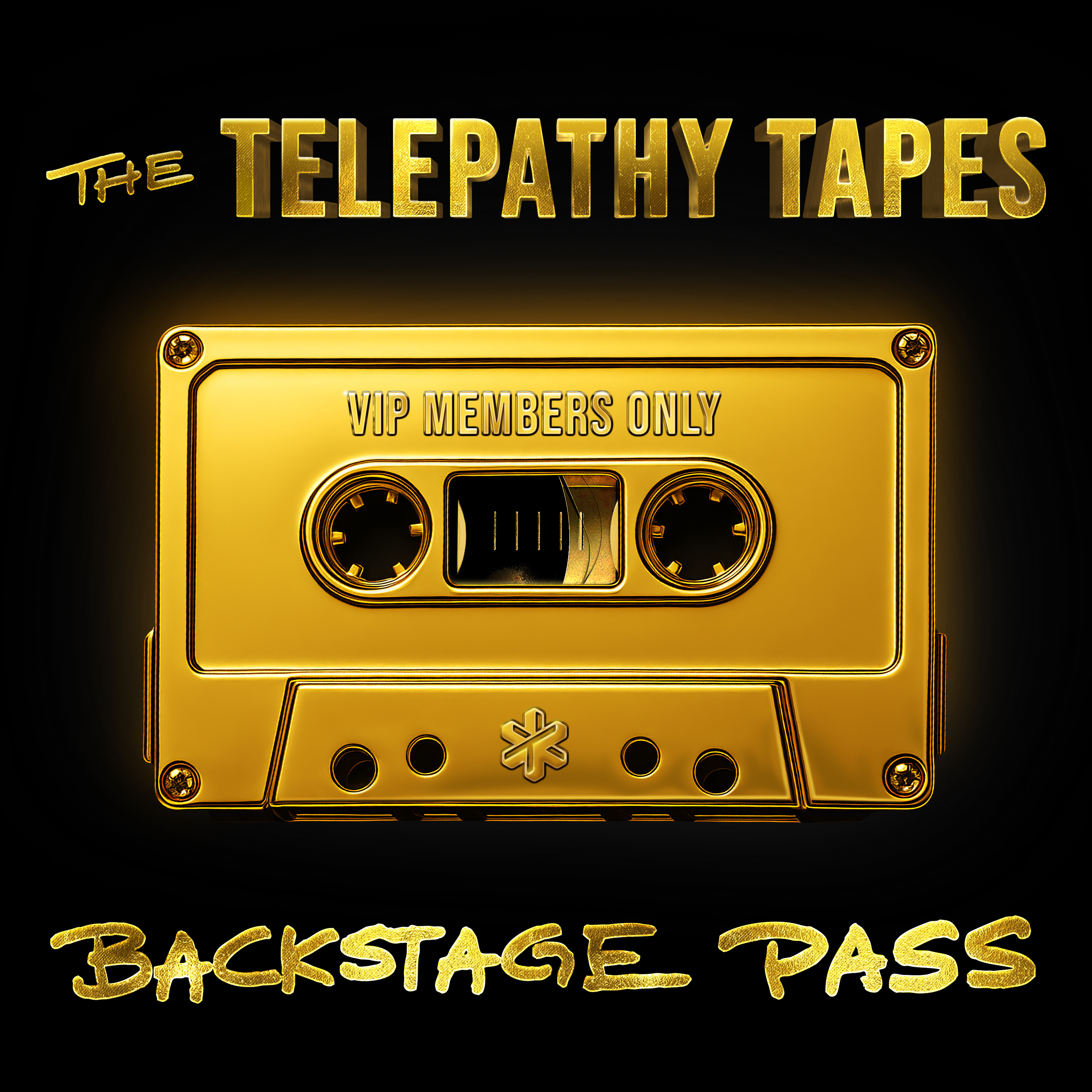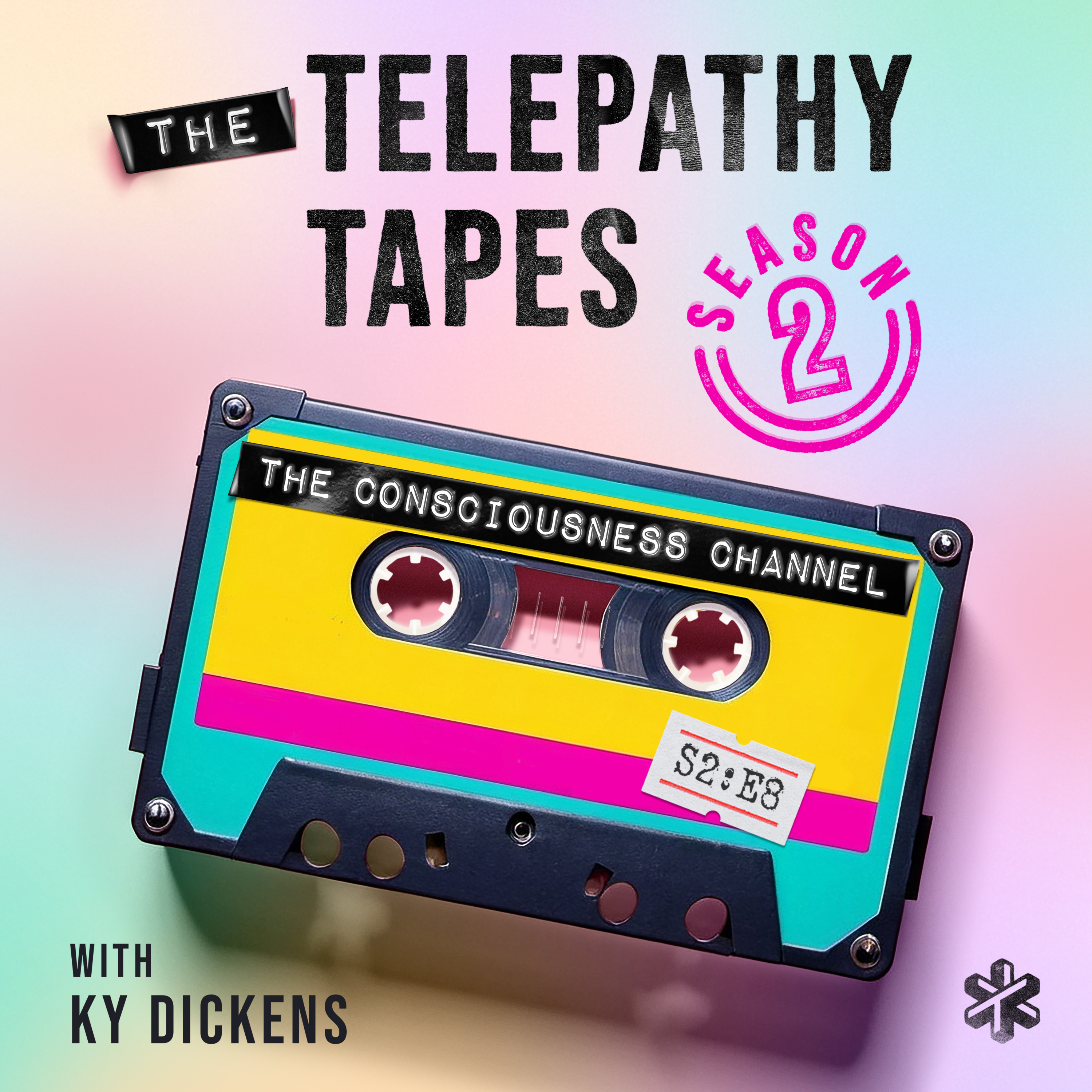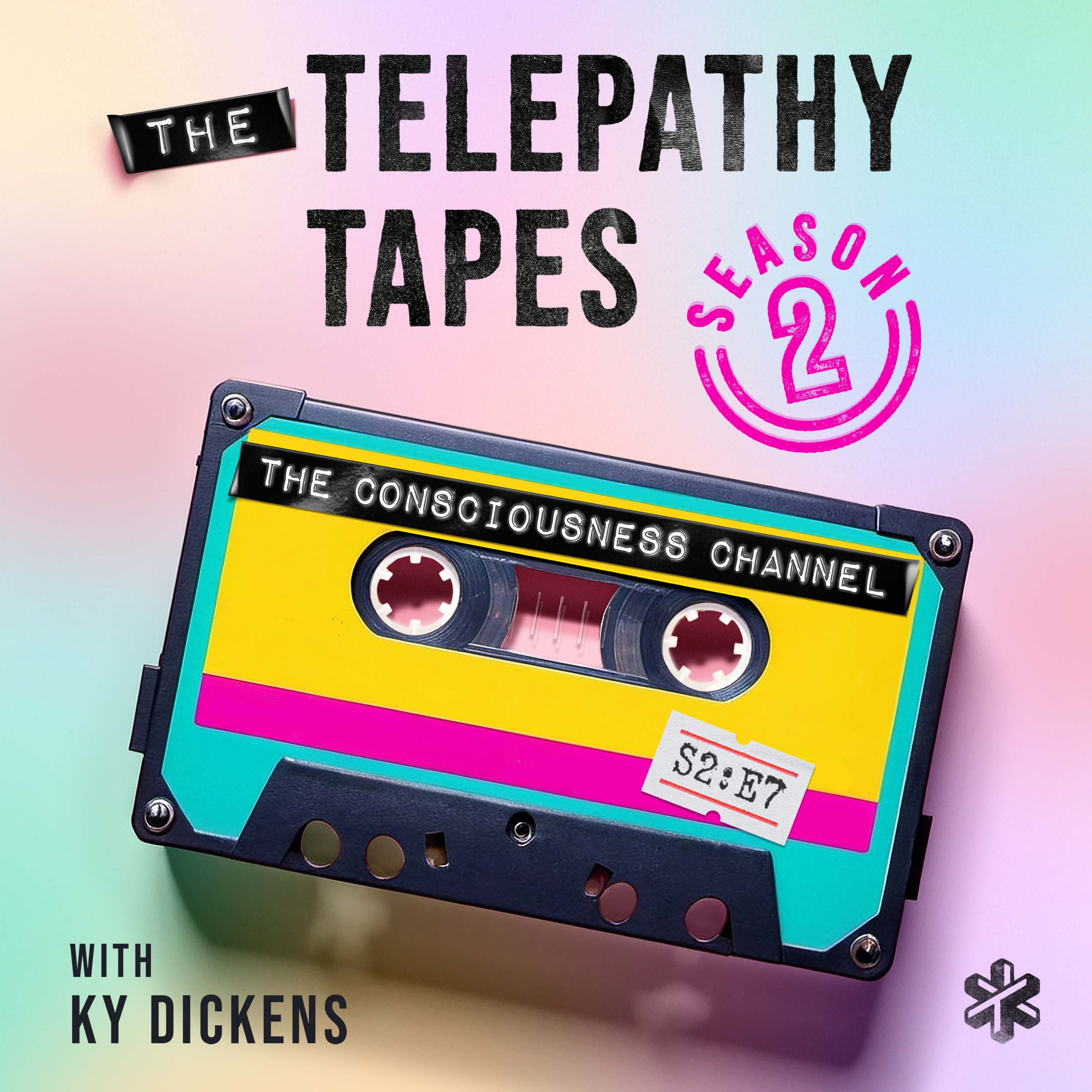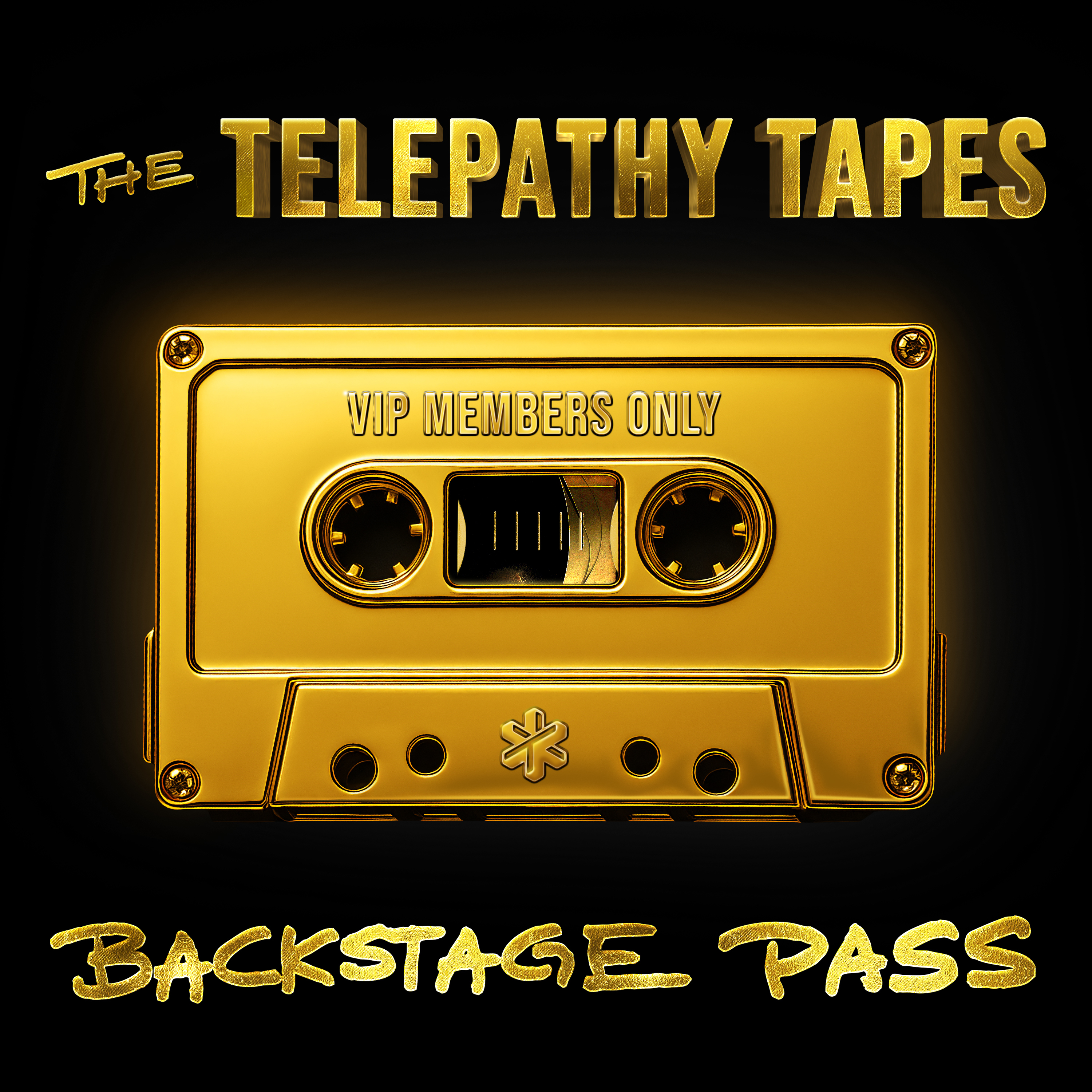Talk Tracks Ep. 14: Testing Telepathy: Trevor’s Story and a New Scientific Tool
In this episode of the Talk Tracks, we revisit a mother and son from season one, Laura and Trevor, who have made an incredible discovery after listening to The Telepathy Tapes. Trevor, a 27 year old nonspeaker with autism from Reno, can read minds. Katherine Ellis, Telepathy Tapes producer, visits Laura and Trevor in Reno to see firsthand how they communicate through telepathy and spelling. Joining them in Reno is Dr. Jeff Tarrant, to test his new technology he has been developing to more accurately test for telepathy among other psi phenomena. Through Trevor’s abilities, his mother’s advocacy and belief and emerging innovations, telepathy and the presumed competence of nonspeakers are closer than ever to becoming an accepted reality.
Join The Telepathy Tapes Backstage Pass to get ad-free episodes, never-before-heard interviews, behind-the-scenes documentary footage, and access to our private Discord community.
This is your invitation to come closer. To help shape what’s next. To be more than a listener… to be a co-creator of this paradigm shift. So if you’ve felt moved, if you’ve felt seen, if you’ve felt the call—subscribe today and join us: thetelepathytapes.supercast.com.
Thank you to our sponsors!
Visit CBDistillery.com and use promo code TAPES to save 25% off your entire purchase.
Visit to Zocdoc.com/TAPES to find and instantly book a top-rated doctor today.
Visit mintmobile.com/TELEPATHY to get this new customer offer and
your 3-month Unlimited wireless plan for just $15 a month.
Save 20% Off Honeylove by going to honeylove.com/TAPES! #honeylovepod
Visit Quince.com/TAPES for free shipping on your order and 365 day returns.
Visit hellofresh.com/TAPES10FM and get 10 free meals with a free item for life.
Function is offering 160+ Lab Tests for $365 to anyone who signs up between July 7th and July 11th. To learn more and get started, visit www.functionhealth.com/TAPES
Visit happymammoth.com to get 15% off on your entire first order at using the code TAPES at checkout.
Learn more about your ad choices. Visit megaphone.fm/adchoices
See Privacy Policy at https://art19.com/privacy and California Privacy Notice at https://art19.com/privacy#do-not-sell-my-info.
Press play and read along
Transcript
Speaker 1 Do you have a story, insight, or research that belongs on the telepathy tapes or talk tracks? Email stories at the telepathytapes.com.
Speaker 1 And if you want to go deeper, ask me anything, or get ad-free episodes, subscribe at thetelepathytapes.supercast.com or tap the supercast link in the show notes.
Speaker 1 Before we dive in today, I want to announce that the second season of the telepathy tapes will be dropping on October 15th.
Speaker 1 So mark your calendars and get ready because season season two, the consciousness channel, is a month away.
Speaker 1 Hi everyone, I'm Kai Dickens and I'm thrilled to welcome you to the Talk Tracks. In this series, we dive deeper into the revelations, challenges, and unexpected truths from the telepathy tapes.
Speaker 1 The goal is to explore all the threads that weave together our understanding of reality. science, spirituality, and yes, even unexplained things like psi abilities.
Speaker 1 If you haven't yet listened to season one of the telepathy tapes, I encourage you to start there. It lays the foundation for everything we'll be exploring in this journey.
Speaker 1 We'll feature conversations with groundbreaking researchers, thinkers, non-speakers, and experiencers who illuminate the extraordinary connections that may defy explanation today, but won't for long.
Speaker 1 Since the release of the telepathy tapes, our team has had a huge influx of email testimonials from families claiming that telepathy is also in their home or who didn't know their child was telepathic tested them and found out that they were.
Speaker 1 One mother really caught our attention with her email. Laura Hirsch is the mother of a non-speaker in Reno named Trevor.
Speaker 1 She didn't realize that her son Trevor had telepathic abilities until listening to the podcast.
Speaker 1 Although I had not yet met Laura or Trevor, Trevor's thoughts were part of season one, episode 10 when the spellers took the mic.
Speaker 1 Here is what Trevor had to say in episode 10 when asked what listeners should do with information they've learned from the podcast.
Speaker 2
I want them to see us in a different light. I am an intelligent man with remarkable spiritual gifts.
I wish they would presume competence in non-speakers.
Speaker 2 And for humanity, I desire compassion and understanding for who we are.
Speaker 1 We are light workers.
Speaker 1 So after this episode was released, Laura wrote to us by email and said, I'm writing to you for one to endorse people with incredible psy abilities of mediumship and spirit artistry, which is like seeing a spirit and then drawing them.
Speaker 1 And then she goes on to describe a conversation she had with Trevor after listening to the telepathy tapes.
Speaker 1 And I quote, after Katie and Houston's episode, I asked Trevor what he thought of Houston's telepathic gifts, and he spelled, I think he nailed it.
Speaker 1 Then I asked if he had met Houston on the hill telepathically and he spelled YES.
Speaker 1 I asked him how long he had been doing that and he spelled most of my life. And note, Trevor is 26.
Speaker 1 And Laura goes on to say, then I asked him when he meets on the hill and he spelled when I'm sleeping.
Speaker 1 When I asked him if there's anything he wanted to add, he spelled he could read my mind and talk to animals and plants. So I decided to see if he really could read my mind.
Speaker 1 That wasn't the original spiritual gift exhibited, which she explained was actually mediumship and his ability to draw spirits.
Speaker 1 So Laura goes on to write that she thought of a random four digit number in her mind three times and handed him the number board and he got them right.
Speaker 1 Wow
Speaker 1 Shortly after this, Laura wrote again with an exciting update. She had a dream, essentially telling her that if she sang songs in her head, Trevor would be able to identify them.
Speaker 1
Trevor has been very musically inclined from a young age. Excited to hear more about her story, we jumped on Zoom to chat.
We started out by talking a bit about Trevor and his interests.
Speaker 3
Well, Trevor's 26. He'll be 27 on July 14th.
And he
Speaker 3
has always loved music. We sing every night together.
I don't hardly hear him say a word all day long, but then every night we sing about five songs and he plays Puff the Magic Dragon and sings it.
Speaker 3 So we spend about an hour and a half on the piano every night now. And other than that, he loves swimming and horseback riding and just
Speaker 3 living his best life right now.
Speaker 1
I love that. That's great.
And how did you hear about the telepathy tapes?
Speaker 3 I first found out about the telepathy tapes podcast through a mutual friend, Susie Miller, who my son Trevor, who's a speller, worked with in the past.
Speaker 3 And we found out, or I found out through her, that they were doing a spellers episode.
Speaker 3 And she thought it would be really good if we participated because she knew that Trevor was a telepathic and talked to his horses telepathically and to his angels just through us being friends on social media.
Speaker 3 So then we were on episode 10 of the telepathy tapes, the spellers episode.
Speaker 3 And then I contacted Kai because I started wondering if, after listening to the tapes, that other kids were doing telepathy with their parents and teachers, if he could do it with me.
Speaker 3
I had never really thought about that. So I tried it one day.
Actually, I had
Speaker 3 done numbers and then bigger numbers, and he got everything correct. Then I started doing just separate words, phrases, sentences, and he got everything right telepathically.
Speaker 3 And Trevor is also a musician. He plays the piano piano and he sings, even though he doesn't speak much at all.
Speaker 3
And so I had a dream that I could sing in my head and he could hear me singing. So that morning I got up and I was like, so excited.
And I go in his room, get him his letterboard.
Speaker 3 And I said, Trevor, can you hear what I'm singing in my head right now? And I sang just the like a snippet of the chorus of Puff Puff the Magic Dragon, which is his favorite song.
Speaker 3
And so in my mind, I sang, Puff the Magic dragon lives by the sea. Hand him his board and he spells it.
And I'm like, no way.
Speaker 3
So I said, let's do another song. So then I did his favorite band is Duranduran.
So I sang just a little bit of the chorus of Rio.
Speaker 3 And I said, what song was that? And he said, he spells Rio. And I said, who sings that? And he spelled Duranduran.
Speaker 3 And I said, who's their lead singer? And he spelled Simon LeBon.
Speaker 3 And I was just floored. So this started in September of last year.
Speaker 3
And every day, almost every day when we spell, I'll ask him a couple songs. I'll do a couple songs in my head.
And he gets everything right.
Speaker 1 Oh my gosh, that's so amazing. So prior to this, did you have any inkling at all that Trevor was telepathic? I know you mentioned he had, you know, really strong connections with his horses.
Speaker 1 Did he ever talk about communicating with them?
Speaker 3 Yeah. So when we started doing spelling to communicate, I'd always ask him questions about activities we did, his opinions on things, because he's an open speller.
Speaker 3 So I said, What did you and Blackjack talk about today? Because he told me he could talk to his horse, like right when he started riding.
Speaker 3
And it was a different horse at the, you know, before Blackjack. And he would spell all these amazing things that they talked about.
And when I knew it was actually
Speaker 3 real and unbelievably, like,
Speaker 3 was when
Speaker 3 a horse horse died
Speaker 3 and no one told Trevor except Blackjack told Trevor when they were riding. And I said,
Speaker 3 you know, what did you and Blackjack talk about today? And he spelled, blackjack was sad today because Buck died. And I said, how did you know that? Did you overhear someone talk about it?
Speaker 3 And he said, no, Blackjack told me. And then a few months later, we just went to visit the horses and he wasn't riding and Blackjack didn't come over by us like he normally does.
Speaker 3 And I said, do you you know what's going on with Blackjack? And he spelled Blackjack was mourning because Sully died and Sully was right next to Blackjack. And again, no one told him.
Speaker 3 I found out that it was true.
Speaker 3 So that's how I knew he was telepathic with his horses.
Speaker 1 We were so intrigued by Trevor's musical telepathy that we decided to connect Laura and Trevor with scientist Jeff Tarrant. who you may remember from season one of the telepathy tapes.
Speaker 1 He's a neuroscientist who specializes in brain scans, and he ran a QEG test on many of the non-speakers.
Speaker 1 We connected Jeff, Laura, and Trevor, and they started working together on a new software that Jeff and a colleague developed to try to scientifically test telepathy and gain some understanding of what is happening in both the sender and receiver's minds when telepathy occurs.
Speaker 1 Trevor, Laura, and Jeff practiced using the software very successfully over Zoom, and then they planned to meet in Reno to give it a go in person.
Speaker 1 Because I personally have been so swamped filming the documentary and putting together season two of the podcast, Catherine Ellis, my right hand, and the telepathy tapes film coordinator flew out to Reno to capture their meeting on film.
Speaker 1 So here's Catherine.
Speaker 5 So I'm heading to Reno tomorrow to meet up with Jeff Laura and Trevor.
Speaker 5 We recently hopped on a Zoom call and planned everything out, and I just couldn't be more excited to meet them in person and get some footage of Trevor's telepathy, as well as the new technology Jeff has been developing.
Speaker 5 Since filming the documentary, I've been traveling all around with Kai and I've seen a ton of telepathy, but I haven't seen it with someone who does it with songs the way Trevor does.
Speaker 5 I've heard that Trevor is incredibly musically inclined. He can play the piano and sing when otherwise he doesn't really speak at all, which is really fascinating.
Speaker 5 I'm learning that these are different parts of the brain, which makes it possible for him. Okay, I'm going to finish packing and head out in the morning.
Speaker 1
We recently rescued another dog named Remy. He came from a tough hoarding situation.
And when he first arrived, he wouldn't eat for two whole days.
Speaker 1
But he finally gave in to Ollie's beef with sweet potatoes, and now he's obsessed. Here's the hilarious part.
At first, we mixed Ollie with the dry food that the shelter gave us.
Speaker 1
But Remy figured out the trick. He would lick every bit of the Ollie off the pellets and then spit the pellets onto the floor.
What I love about Ollie is they offer three meal plans to choose from.
Speaker 1 So you can choose between a full fresh plan, fresh topper plan, or a mixed plan with their freshly baked recipes for your special fur baby. They also have treats and supplements.
Speaker 1 Ollie is the only fresh dog food that comes with unlimited routine health screenings so you can get your pup on track to living their healthiest, happiest life.
Speaker 1 Dogs deserve the best and that means fresh, healthy food. Head to ollie.com slash tapes, tell them all about your dog, and use code TAPES to get 60% off your welcome kit when you subscribe today.
Speaker 1 Plus, they offer a happiness guarantee on the first box, so if you're not completely satisfied, you'll get your money back.
Speaker 1 That's ollie.com slash tapes and enter code tapes, T-A-P-E-S, to get 60% off your first box. A lot of people aren't aware aware of how much they spend each month.
Speaker 1 I mean, do you know offhand how many subscriptions you actually pay for? What about how much you spend on takeout or delivery? It's probably more than you think.
Speaker 1 But there's an app designed to help you manage your money better, Rocket Money.
Speaker 1 Rocket Money is a personal finance app that helps find and cancel your unwanted subscriptions, monitors your spending, and helps lower your bills so you can grow your savings.
Speaker 1 Rocket Money shows you all your expenses in one place, including subscriptions you forgot about. If you see a subscription that you no longer want, Rocket Money will help you cancel it.
Speaker 1 You can get alerts if your bills increase in price, if there's unusual activity in your accounts, or if you're close to going over budget, and that's even when you're doing a good job.
Speaker 1 Rocket Money's 5 million members have saved a total of 500 million and canceled subscriptions, with members saving up to $740 a year when they use all of the app's premium features.
Speaker 1
Cancel your unwanted subscriptions and reach your financial goals faster with Rocket Money. Go to rocketmoney.com/slash tapes today.
That's rocketmoney.com/slash tapes. Rocketmoney.com slash tape.
Speaker 5 I arrived in Reno early in the morning and went over to the hotel where we planned to conduct the tests. First, I wanted to get a really great description from Jeff on how the software works.
Speaker 1 Okay, Jeff, can you first just briefly introduce yourself? Who are you? What do you do?
Speaker 4 And what is this software that you're developing?
Speaker 6 Yeah, my name is Jeff Tarrant, and I'm a psychologist, neuroscientist.
Speaker 6 And a lot of the work that I've been doing is related to EEG monitoring of brain waves, and especially folks who demonstrate some sort of interesting abilities.
Speaker 6 So medium psychics, and in this case, telepathy. And the software that we've been developing, it's actually a web-based software that is designed to,
Speaker 6 specifically for telepathy testing. There's essentially three computers to try to keep everything as separate as possible so that there's no way that anybody else in the triad knows what's happening.
Speaker 6 Yeah.
Speaker 6 To keep it as clean and free from any kind of queuing or interference, one computer is designated as the manager, then the other two computers, one will be the sender and one will be the receiver.
Speaker 6
And because it's web-based, we could keep these as separate as possible. They could be in different rooms.
They could be in different states. And we could do this testing.
Speaker 6 And so that's one of the reasons we developed it this way is so that we could actually do remote testing so that we don't always have to be in person to be able to get good data.
Speaker 5 Jeff went on to discuss some more details on how the system works. You can watch the full explanation on the Telepathy Tapes YouTube channel.
Speaker 5 After he wrapped up explaining the process, Trevor and Laura showed up.
Speaker 5 Hi!
Speaker 5 Hi, Trevor.
Speaker 7 Nice to meet you. I'm Catherine.
Speaker 7 Nice to meet you. How's it going today? Trevor, are you up for some tests today?
Speaker 5 I wanted to make sure the songs we chose were totally random and not influenced at all by Laura or Trevor.
Speaker 5 So I explained how Jeff and I planned to use ChatGPT to generate song ideas for Laura to sing in her head and Trevor to telepathically catch on to.
Speaker 7 We were thinking also like because we want it to be so random for ChatGPT,
Speaker 7 we will show that we are generating on ChatGPT and then maybe have you two sitting here.
Speaker 7 doing it just with the letterboard. And then if he's feeling it, we'll move on to the software.
Speaker 5 once trevor and laura were settled we started asking chat gpt for some song ideas we're gonna get some random songs trevor likes songs from the 80s so we're gonna say can you give me a list of random 80s rock
Speaker 2 songs
Speaker 2 the names
Speaker 5 artists
Speaker 5 and what did you say lead singer and lead sayer jeff why don't you point to the one you want to choose see if i can sing them oh Oh, there's so many to choose from.
Speaker 4 Any random one, Jeff.
Speaker 6
I know, okay. You've got it.
How about how about this one?
Speaker 1 Okay.
Speaker 5 Jeff selected the song Hold the Line by the artist Toto. I showed the song title and artist to Laura, making sure Trevor couldn't see anything.
Speaker 5 She said she was familiar with the song, but that Trevor may not be.
Speaker 3
Okay, we'll see. Okay, let's see if you know this one.
I'll start in my head first.
Speaker 2 Okay, well sounds.
Speaker 5 Trevor starts spelling.
Speaker 4 H,
Speaker 4 O,
Speaker 4 L,
Speaker 4 D, hold,
Speaker 4 T,
Speaker 4 H,
Speaker 4 E,
Speaker 4 hold the,
Speaker 4 L,
Speaker 4 I,
Speaker 4 N,
Speaker 4
E. Beautiful.
Wow.
Speaker 5
Trevor is so cool. Hold the line.
Did you know that song before she sang it?
Speaker 2 And who sang that? Who sings that song? Do you know who sings Hold the Line?
Speaker 4 And
Speaker 1 it's Toto, but you knew the song, oh, you've probably heard that song.
Speaker 5 We continued to randomly select songs, and every time Trevor got it right. Multiple times to Laura's surprise.
Speaker 5 Half the time, she couldn't even believe he knew the names of so many of the artists, as that's not something they regularly discuss.
Speaker 5
But time and time again, Trevor spelled the song Laura sang in her head. It's incredibly cool.
After this, we tried to move on to the software Jeff had been developing.
Speaker 5 I watched him work hard to use it, but he wasn't consistently getting answers right. He seemed to be struggling a bit with the interface.
Speaker 5 He got some right, but at one point spelled out that the computer screens didn't feel natural for him to work with.
Speaker 5 What a lot of people may not understand is that because controlling one's body is so difficult for individuals with apraxia, switching from a laminated letterboard to a keyboard or a computer screen isn't as simple as most people would think.
Speaker 5 It's almost like learning a new skill over again. Jeff explains this.
Speaker 8 So, you know, with the computer-based system that we're using,
Speaker 8 you know, initially, Trevor was having a little bit of trouble because just with his physical body and being able to transition from using a laminate letterboard, which is what he's used to,
Speaker 8 to independently typing the responses
Speaker 8 on the computer.
Speaker 8 And we set it up so that initially that was pretty much the only way they could respond was by sort of an emulation of a letterboard on the computer that he would type the responses into.
Speaker 8 We expanded that so that he could also use the keyboard if he wanted to and you know a QWERTY keyboard. And
Speaker 8 it was interesting because very quickly, Trevor started getting much better at that.
Speaker 8 What we had to do was sort of back back up a little bit and allow Laura to provide some prompts and some assistance.
Speaker 3 Trevor spells and he uses a laminated board. So going to a computer is a whole different set of skills that you have to learn.
Speaker 3 And just like coaching, taking off the training wheels gradually to be independently typing.
Speaker 3 So we worked on that and he was 100% accurate on everything. And Jeff said that the probability of getting everything, just guessing, is I forget how many millions to one, but to get them all right,
Speaker 3
just impossible. By the fourth time, we did it four times, I think.
And by the fourth time, I was barely,
Speaker 3 I was just sitting and watching him do it and
Speaker 3
not coaching him, not cueing him, you know, up over. Usually that's how you do it.
You're cueing their motor. So it's creating new neuronal pathways in the brain.
And then they're there.
Speaker 3
Once they're there, they're permanent. So it's just their issue is motor planning.
And
Speaker 3 then once they master any skill, it's like him playing the piano, him spelling, him going from one board to another, from going to a board to a computer. It's just learning those motor skills.
Speaker 3 And like I said, practice makes permanent is what they say in SUC.
Speaker 5
After working with Trevor on the new interface, Laura didn't need to assist him at all. He was completely independently typing.
I spoke to Jeff a couple of months after our in-person visit about this.
Speaker 8
The last time we practiced, she wasn't doing anything. She wasn't touching anything.
She wasn't moving her body. She wasn't vocalizing anything.
Speaker 8 And Trevor would completely independently type the answers out. And, you know,
Speaker 8 we did several different types of tests. Some of them were,
Speaker 8
you know, one and two syllable random words. Some of them were two or three digit numbers, random numbers.
And then some of them were Zener cards where he would choose which card Laura was looking at.
Speaker 8 And, you know, out of five choices.
Speaker 8 And honestly, he really didn't miss.
Speaker 8 Again, at the beginning, he might miss a few, but the more comfortable he got with the system, he really wasn't missing any.
Speaker 8 And so, again, statistically, it's just ridiculous, you know, especially when you're looking at something,
Speaker 8 you know, because there's a difference between a forced choice test like the Zener cards, because you have a one-in-five chance of guessing correctly.
Speaker 8 So, you know, you can get 20% right just by chance. But of course, he was getting closer to 100%.
Speaker 8 So, again, statistically, that's pretty ridiculous. But then there's
Speaker 8 a difference with the open responses. So, if we're asking him to
Speaker 8 repeat or type out a random word, well, that could be any word.
Speaker 8 And again, so statistically, even getting one correct is
Speaker 8 totally improbable.
Speaker 8
And again, he would get, you know, several correct in a row. So we were mixing up these tests, and he was basically not missing any.
And, you know, so statistically, it's off the chart.
Speaker 5 And was Laura cueing Trevor at all, like moving her body in any way or anything that could have been signaling the answer to him somehow?
Speaker 8
No, I mean, so, you know, initially she was to help him learn how to use the keyboard. But once we got to the place where we are at the moment, she's not touching the keyboard.
She's not moving.
Speaker 8 You know, every once in a while, she'll move a little bit, but it's funny because I think it's just out of habit. It's just, you know, from the way that they're used to spelling.
Speaker 8 And so typically what I'll do is if I see her do that, I just won't count that one. Even though the movements are very subtle, they're very small.
Speaker 8 I can't see a way that that would be cueing him to something. But nonetheless, just to be safe, I just don't count those.
Speaker 8 But so, even if we take those out,
Speaker 8 he's still getting
Speaker 8 95% correct. And
Speaker 8 with Laura doing nothing, she's not vocalizing, she's not touching anything.
Speaker 8 And so, so yeah, to me, this is
Speaker 8 great
Speaker 8 additional evidence, right? That it's like that we can demonstrate this and we can demonstrate it with
Speaker 8 tighter
Speaker 8 research parameters so that we can eliminate
Speaker 8 the things that people are concerned about, that there may be some queuing or things like that going on. And so I think what we're learning is that in many cases, it just takes some practice.
Speaker 8 And the practice is really mostly getting them used to using a format that's a little bit more controlled because that's just not what they're used to.
Speaker 8 And that's something that I learned in this process because, you know, coming at it from sort of a neurotypical perspective, it's like, well, what's the big deal? What's the difference between
Speaker 8 pointing to a letterboard and pointing to a computer screen? Right? Like it's the same thing, but it's not the same thing.
Speaker 8 And so one of the things that I've had to learn is that with these non-speakers, every time you change the format, even a little bit, how, you know, then it is, it's like starting all over.
Speaker 8 It's like, oh, this is a whole new skill.
Speaker 8 It doesn't necessarily generalize the way that we would expect it to, right? That when we're thinking of sort of a neurotypical person, right? That it's like, oh, sure, you just, it's the same thing.
Speaker 8
And it's like, well, it's not the same thing. And, you know, because of the motor control issues.
So
Speaker 8 I think what it means is that it's like, you know, when we're doing research, with this population, we just need to allow them to have some time to adapt to whatever the new format is and let them get used to it.
Speaker 8 And once they get used to it, they do amazing.
Speaker 8 So I think we can have tighter controls on the research.
Speaker 5 What are your plans for the future of this software? Are you testing it on more people or is it changing at all?
Speaker 8 Yeah,
Speaker 8 we've been continually adapting the software based off of our experiences working with the non-speakers and learning from them because they will tell us what works and what doesn't work, what things that they would need, what things they would like.
Speaker 8 And so we're adding in additional types of tests. So using images, using short videos, and really what we're starting to use now is short stories.
Speaker 8 And the reason for that is because it's more engaging for them as opposed to just repeating a word.
Speaker 8 right that's that's kind of boring uh it's like here repeat this word to me and it's like okay uh it's it's not very exciting and, you know, gets boring very quick.
Speaker 8 And so what we're finding is that if we make the stimulus a little bit more interesting, then they're much more engaged and it's easier for them to follow through with the process.
Speaker 8 And what's also interesting about that is,
Speaker 8 you know, when it's something that's more dynamic like that, I think it's even more evidence that this is coming from them because the responses that they give are not necessarily things that we would come up with ourselves.
Speaker 8 You know, they have their own thoughts about these stimulus that maybe are different than what we would perceive or how we would look at something.
Speaker 8 So
Speaker 8 yeah, you know, we've been using this with, I mean, probably now, I'm not even sure, maybe a dozen non-speakers, and they're at various points of success. with this.
Speaker 8 And so we're just continuing to practice with them until we can get to a point where what we would like, from a a research perspective is for them to be able to do this in separate rooms so that the sender and the receiver are actually in completely separate rooms.
Speaker 8 But that's another skill, right? That's another, that's a whole nother level of something they have to learn how to do because that's not what they're used to.
Speaker 8 And so that's what we're working up to with a lot of these
Speaker 8 non-speakers, and it's going really well.
Speaker 5 The success of this software is incredibly promising and far from over.
Speaker 5 As Trevor's quiet brilliance continues to challenge our understanding of communication, Jeff's new tool to study it holds the power to change what we think is possible.
Speaker 5 In fact, he's already been a part of validating message passing in controlled environments.
Speaker 5 Those findings will be featured in our upcoming documentary film, where science meets something that still can't quite be explained.
Speaker 5 I wanted to end the episode with some of Trevor's thoughts and a clip of him playing piano while singing Puff the Magic Dragon, his favorite song.
Speaker 5 I was curious about what he's looking forward to most in life right now and how autism has affected his life. Here are his answers read by Laura, followed by a clip of him singing.
Speaker 5 If you want to hear more about Laura and Trevor's story, you can check out the book they wrote together called More Than Meets the Eye, A Non-Speaker's Journey Through Music, Spelling to Communicate, and Becoming a Divine Messenger.
Speaker 2
Hi, so this is Laura, Trevor's mom. Catherine had sent over some questions for me to ask him to spell his responses to.
And here they are.
Speaker 2 Number one, what does reading a person's mind feel like to you? And second, are you able to do it with everyone or just people you're close with? He spelled, it feels natural.
Speaker 2 It's easier than speaking. And I can read anyone's mind if I want to.
Speaker 2 Question two, I know you have a special relationship with horses. Do you communicate with other animals as well? And he spelled, yes, all of them.
Speaker 2 Third one is, what are you looking forward to the most right now? And he spelled, helping humanity with my abilities.
Speaker 2 Question four,
Speaker 2 if you could travel anywhere in the world, where would you go? And he spelled, I would go to California by the ocean.
Speaker 2 Number five, what's your favorite part about being someone with autism? And he spelled, I have gifts that I had to develop and can show others what is possible.
Speaker 2 Number six, if you could give the world a message of hope, what would it be? And he spelled, I am an example of what autistic non-speakers are capable of.
Speaker 2 Don't give up.
Speaker 2 I dusse
Speaker 2 and fly
Speaker 2 and
Speaker 1 That's it for this episode of the Talk Tracks, but new episodes will now be released every other Sunday, so stay tuned as we work to unravel all the threads, even the veiled ones, that knit together our reality.
Speaker 1 Please remember to stay kind, stay curious, and that being a true skeptic requires an open mind. Thank you to my amazing collaborators.
Speaker 1 Original Music was created by Elizabeth P.W., Original Logo and Cover Art by Ben Kendor Design, the audio mix and finishing by Sarah Ma, our amazing podcast coordinator, Jill Pachesnik, the Telepathy Tapes Coordinator and My Right Hand, Catherine Ellis, and I'm Kai Dickens, your writer, creator, and host.
Speaker 1 Thank you again for joining us.
